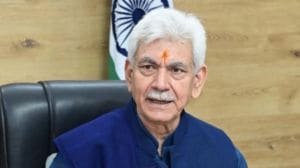Govt to test Iraq waters with envoy
Keen to be counted upon as a big international player in Iraq, but afraid of a public outcry against any move to send troops to that country...

Keen to be counted upon as a big international player in Iraq, but afraid of a public outcry against any move to send troops to that country, India today sought to delicately walk between the lines by announcing the return of its ambassador to Baghdad.
‘‘We can’t walk away from Iraq, the question is how can we walk back into Iraq,’’ Foreign Secretary Kanwal Sibal admitted to reporters today in an hour-long press conference where he refused to either commit or rule out Indian participation in a ‘‘stabilisation force’’ for Iraq.
|
Congress says sending troops to Iraq ‘wrong’
|
| NEW DELHI: The Cong on Monday opposed the Centre’s proposal to send troops to Iraq saying it was ‘‘wrong’’ and was ‘‘in contravention’’ of the resolution passed in Parliament for immediate withdrawal of forces from Iraq. Party spokesperson Jaipal Reddy said: ‘‘We are opposed to it because it is in contravention of the unanimous resolution passed by both the Houses of Parliament seeking immediate withdrawal of troops of coalition partners from the state,’’ he said. ‘‘We have a tradition of sending troops to the UN peace keeping missions. If a peace keeping force is organised under the aegis of the UN, then it would be a different proposition,’’ he said. He suggested that so long there was no UN resolution on sending troops to Iraq, ‘‘Indian troops should not be sent to Iraq’’. (ENS) |
Under the circumstances, India it will now begin a series of consultations not only with the newly appointed UN representative on Iraq, but also key powers like the US and UK as well as neighbouring countries.
The Foreign Secretary said India would seek ‘‘clarifications on the parameters and scope’’ of the UN appeal, including the authority under which Indian troops and other civilian personnel could function in Iraq.
MEA sources pointed out that the UN fig leaf was clearly ‘‘not large enough’’ to warrant outright Indian participation even though the UNSC resolution had clearly mandated a Chapter 7 peace-enforcement operation. The MEA will report back to the CCS after it has assured itself of the role Indian troops as well as civilian personnel would play in Iraq.
Accepting that the US had asked India and other nations to help keep the peace in Iraq, Sibal pointed out that the situation had now changed considerably after the passage of the UN resolution last week.
‘‘I am not foreclosing any options, not prejudging anything,’’ Sibal said in response to a volley of questions. He would also not comment on whether New Delhi could provide either ‘‘personnel or equipment’’ under the US-UK authority that for the time being runs Iraq.
But an indication of New Delhi’s return to pragmatism, after its parliamentary resolution two months ago criticising the US on its Iraq war, is the decision of the Cabinet Committee today to send Ambassador B.B. Tyagi back to Baghdad.
Even though Tyagi had presented his credentials earlier to the Saddam Hussein government, which has now been replaced by a US-UK-led authority, the Government accepts that India ‘‘must be part of the future of Iraq.’’
Today’s CCS meeting was preceded by a detailed briefing in the ‘war room’ in South block by the three service chiefs to the Prime Minister. Army Chief Gen N.C. Vij and the Director General of Military Operations Lt Gen B.S. Thakkar briefed the leaders on commitments of the armed forces, including enhanced deployment in J-K in connection with the ongoing operation Sarp Vinash against militants.
The Army and intelligence top brass told the leaders that at the moment there could be no thinning of troops from J-K.
The CCS welcomed the resolution 1483 as a ‘‘way forward’’ on Iraq and sought clarifications on the appeal to member states to ‘‘contribute to conditions of stability and security’’ in Iraq.
Responding to a spate of questions, Sibal insisted the ‘‘situation on the ground in Iraq is currently not fully stable’’ and there are law and order problems. Besides the political process had not acquired a clear dimension. There was also need to understand the role of the special advisor of the UN secretary general for Iraq.
He said the UN resolution has come to terms with the coalition presence in Iraq recognising it as an ‘‘authority.’’






- 01
- 02
- 03
- 04
- 05

























